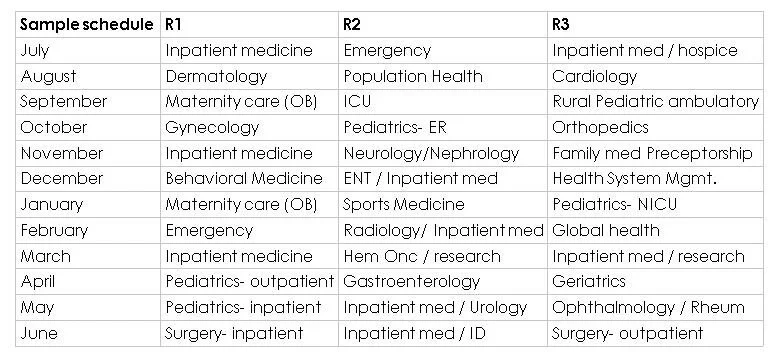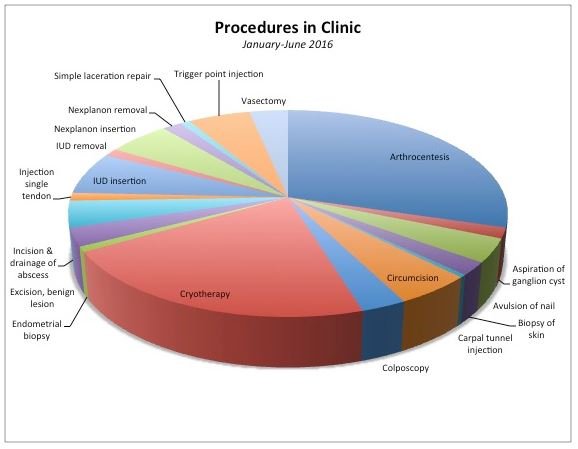Curriculum
FAMILY MEDICINE CENTER
At the heart of Family Practice is continuity in taking care of your own panel of patients. Most residencies start out with minimal clinic exposure and a lot of time in the hospital. Our program puts a major emphasis on your personal clinic experience, the foundation of a successful Family Physician. Our trademarked program is called Clinic Every Day. During all three years of the residency you will see patients in the Family Medicine Center 5 days per week, even when you are on call - just like when you are out in practice.
Being in clinic on a daily basis means:
1) when your patients call, the receptionist will tell them that you'll be in today or tomorrow, not next week like a traditional program,
2) when lab results come back, you'll review them immediately and take appropriate action, and
3) when you see a really sick patient who needs follow-up tomorrow, you'll do the follow-up visit on your patient, not your colleague whom the patient hasn't met.
Our FMC, the St. Mark's Family Medicine Center, is based right out in the community where the patients are. We see approximately 15,000 patients per year.
NOON CONFERENCE DIDACTICS
Every weekday there is a noon conference with lunch provided. The topics covered are diverse from an EKG course to Balint Group, where residents discuss how they feel about certain patient interactions (without the faculty present). The speakers include the residency faculty, rotation directors, resident presentations, and many outside speakers too. Residents are in charge of scheduling the lectures, so we get the lectures we want.
ROTATIONS
Family Medicine Hospital Service
Patients are admitted to the hospital from our Family Medicine Clinic (FMC) and from the community.
Months on FMS: First year - 3; Second year - 2; Third year - 1
Details:
R1 patient load is 5-6 patients/day, diminishing toward the weekend
Pharmacy rounds with our team every day
Rotation length: First year - 3 months; Second year - 2 months; First year - 1 month
General schedule:
R1s from 7 AM - 9PM Monday (for general hospital admits); 7 AM – 7 PM Tuesday – Friday, Saturday morning rounds
Interns manage the service independently under the attending on Monday mornings and Tuesday afternoons
Attendings and senior residents who not on service are always available for guidance
R2/R3s 12 PM Monday – 12 PM Tuesday (overnight), 7 AM – 7 PM Tuesday – Friday, Sunday rounds
Call Schedule: First year - no overnight call; Second year & Third year - on call from home for our inpatients, admissions of any of our clinic patients, phone calls from patients at our clinic and at the skilled nursing facility that we oversee.
Obstetrics/Gynecology:
Residents complete 3 months of OB care over 3 years.
Recommended delivery numbers: 30 non-continuity patients, 10 continuity patients
We deliver at St. Mark’s Hospital and work closely with the OB faculty and hospitalists during the month
Time is split between OB clinic with a family medicine-trained obstetrician, L&D deck, and our continuity clinic
Advanced Life Support in Obstetrics (ALSO) training provided in first year
Residents work one on one with attendings in the community ranging from general gynecology practices, gyn-onc clinic, and the pelvic pain clinic
Surgery:
Residents work the general surgeons, orthopedic surgeons, urologists, anesthesiologists etc when on their surgery rotation.
Experience developed in preoperative diagnosis, placing IVs, intubation, suturing, surgical assisting, postoperative management, and ambulatory surgical procedures. You can spend time in surgery clinics or with the wound care team.
Behavioral Medicine:
Residents work with psychiatrists and APRNs in the community
Residents perform a reflective session annually during noon conference, and behavioral medicine is addressed 2-3 times per month in noon conference
Dermatology:
Residents work with clinicians in the community, including those performing Moh’s surgery
Sports Medicine/Orthopedics:
Residents work with clinicians at St. Mark’s and in the community.
Winter ski clinic during second year seeing many patients with sports injuries
Gain experience in casting, splinting, and joint aspirations and injections.
Opportunities to complete pre-sports evaluations and be the team doctor in various venues
Cardiology:
Residents work with Cardiologists at St. Mark’s hospital in clinic and on the inpatient service.
Emergency Department:
Residents work at St. Mark’s ER a total of 2 months (200 hours)
Residents also work at the Primary Children’s Emergency Department for a dedicated pediatric emergency rotation
The St. Mark's Hospital ER has 40,000 visits per year, and is a Level II Trauma Center.
Certification in ACLS and ATLS in the first year
Pediatrics:
Residents work on a Family Medicine inpatient team at Primary Children’s Medical Center (PCMC) during the busy winter months
Residents see well babies in the nursery while on the family medicine service
R1s - one month of outpatient pediatrics with one of many community general or specialist pediatricians, and one month of inpatient pediatrics at PCMC
R2s- one month of pediatrics ER at PCMC, and one month of outpatient pediatrics or NICU at St. Mark's Hospital under the supervision of the staff neonatologists.
PALS and NRP are provided in the first year
ICU:
One month in the second year with one on one training with the intensivist physicians at St. Mark's Hospital
Opportunity learning many aspects of critical care, including intubation, ventilator and pressor settings, arterial and central line placement, and pulmonology procedures
Community Medicine/Population Health:
Residents explore community resources, such as the county health department, an HIV clinic, AA meetings, and an occupational medicine facility.
Residents may also work on their research and QI projects during this month
Geriatrics:
Residents work at our faculty-run post-acute rehab center
Residents also follow two long-term nursing facility patients throughout residency
Home visits and hospice visits completed during this rotation
Preceptorship:
This very important rotation gives the resident a chance to experience potential future practice opportunities. Options available include rural, suburban, and academic practices.
Practice Management:
Residents spend a month honing their business in medicine skills
Residents need to learn the business side of medicine, and this is the rotation to do it.
Residents also attend a hospital committee through residency to further their understanding of hospital management
Coding and billing is taught throughout residency, including didactics from our in-house coding staff
Radiology:
The radiologists at St. Mark's Hospital teach our residents about plain films, CT, MRI, mammography, ultrasound, and nuclear medicine.
Residents read the X-rays in the FPC on their own patients, and then the films are over-read by a radiologist for teaching and quality control.
Lifestyle Medicine:
St. Mark's Family Medicine is committed to training future physicians in the principles of Lifestyle Medicine, equipping residents with the skills to promote health and wellness through evidence-based lifestyle interventions. With a focus on nutrition, physical activity, stress management, and other key areas, our residents gain comprehensive training to address the root causes of chronic disease and improve patient outcomes.
Elective Rotations:
Some of the options available include: plastic surgery, a procedures clinic, podiatry, endocrinology, rheumatology, allergy, sports medicine, and numerous pediatric subspecialties or best yet, set up a rotation abroad.
ANNUAL RETREAT
Part of our curriculum is having fun. Each year our program has an annual retreat in an out of town location. In recent years, we have retreated in Park City and Solitude Resort.
Procedures
We get a wide variety of procedural experience both in the clinic and on our rotations:


